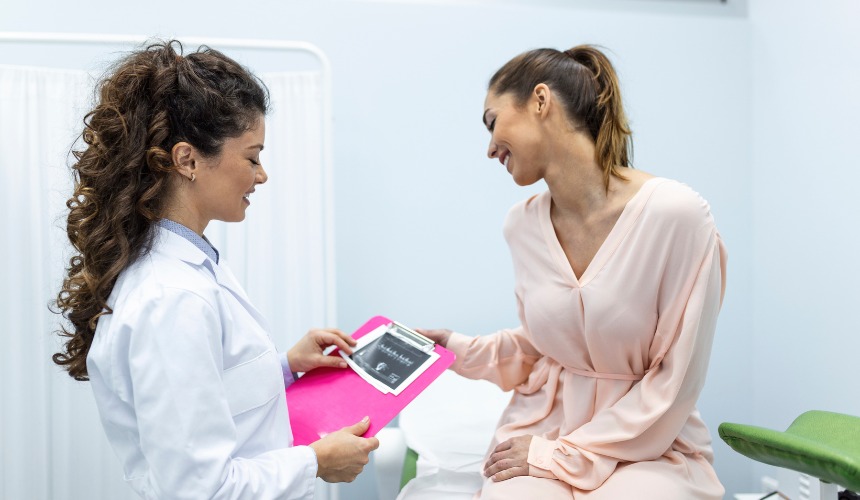Author: Dr. Madhushree Vijayakumar MBBS, MRCOG, FRCOG, DGO
Consultant: Obstetrician and Gynecology at Motherhood Hospital Hebbal, Bangalore
What is Ovulation?
A developed egg is released from one of the ovaries at the crucial stage of ovulation, which is part of the female menstrual cycle. The ovulation cycle’s core function is controlled by a complicated interaction of hormones. Normally, a woman releases her egg, or ovum, 14 days before the beginning of her subsequent menstrual period, in the middle of her menstrual cycle. This is sometimes referred to as the “fertile window” since it denotes the time when a woman has the best possibility of getting pregnant. For women attempting to get pregnant as well as those trying to prevent becoming pregnant, understanding ovulation is essential. It also sheds light on a woman’s menstrual cycle’s regularity and health.
10 Signs of Ovulation for Pregnancy
While ovulation calculators can provide an estimate of your fertile window, it’s also essential to recognize the physical signs and symptoms that indicate ovulation is occurring. These symptoms can serve as a natural ovulation calculator, helping you understand when you’re most likely to conceive.
Here are some common ovulation symptoms:
- Rising Body Temperature: After ovulation, you may notice a slight increase in your basal body temperature, which is your body’s temperature at rest. This rise in temperature is due to an increase in the hormone progesterone, which is released after ovulation. Tracking your basal body temperature over several months can help you notice this pattern and predict when ovulation is likely to occur.
- Tenderness of the Breasts: Some women experience mild breast tenderness or sensitivity around the time of ovulation. This is also due to the hormonal changes that occur during this phase of the menstrual cycle. While this symptom can also occur in other phases of the cycle, noticing a pattern of breast tenderness can help you identify when ovulation is happening.
- Mild Cramps in Your Lower Abdomen: Known as mittelschmerz, some women feel a slight twinge or cramp in the lower abdomen, usually on one side. This pain is thought to occur when the ovary releases the egg. While not all women experience this symptom, those who do often find it to be a reliable sign of ovulation.
- High Levels of Luteinizing Hormone (LH): Just before ovulation, the body releases a surge of LH. This hormone triggers the release of the mature egg from the ovary. Ovulation tests detect this surge to predict when ovulation is likely to occur. These tests can be a helpful tool in addition to an ovulation calculator.
- Mild Spotting: A small amount of light spotting or discharge is another potential sign of ovulation. This spotting is usually a light pink or brown color and occurs around the time of ovulation. While spotting can also be a sign of other health issues, if it occurs regularly in the middle of your cycle, it could be a sign of ovulation.
- Increased Sex Drive: Hormonal changes during ovulation can lead to an increased libido. This is nature’s way of increasing the chances of conception during the fertile window. If you notice a regular pattern of increased sex drive during your cycle, this could be a sign that you’re ovulating.
- Elevated Sense of Smell: Some women report an increased sense of smell during ovulation, which may be due to elevated levels of certain hormones. While this symptom is less common, some women find it to be a reliable indicator of ovulation.
- Bloating: Hormonal fluctuations during ovulation can cause water retention and bloating. This can be uncomfortable, but it’s a common symptom of ovulation. If you notice regular bloating in the middle of your cycle, this could be a sign of ovulation.
- Cervical Mucus Change: Around the time of ovulation, you may notice that your cervical mucus becomes clear and stretchy, similar to egg whites. This change in mucus is a sign that you’re in your fertile window. Tracking these changes can help you predict when you’re ovulating.
- Headache and Nausea: Some women may experience headaches and nausea during ovulation, although these symptoms can also be associated with premenstrual syndrome or other conditions. If you notice a pattern of headaches or nausea in the middle of your cycle, this could be a sign of ovulation.
By noticing some of the above mentioned ovulation symptoms, a woman can start to predict when she is likely to ovulate and plan intercourse accordingly. This can be particularly helpful for couples trying to conceive, as it allows them to time intercourse to coincide with the woman’s fertile window, thereby increasing the chances of conception.
However, it’s important to remember that many factors can influence ovulation and fertility, and this method is not foolproof. Stress, illness, changes in routine, and certain medications can all affect the timing of ovulation. Therefore, while ovulation prediction charting can provide valuable insights into a woman’s fertility, it should not be the only method used to predict ovulation. It’s always a good idea to discuss any fertility concerns with a healthcare provider, who can provide additional guidance and support.
Motherhood Hospitals has a team of experienced supers specialists backed by the latest infrastructure and facilities. We have the best gynaecologist in Hebbal, Bangalore. We are experts in handling complex deliveries, gynaecological, and other surgeries, including various laparoscopic surgeries.
Do make an appointment with the best maternity hospital in Hebbal, Bangalore at a centre closest to you. Meet with our doctors, who will carry out the required investigations, diagnose the issue and recommend the most appropriate treatment, enabling you to lead an active life.
If you wish to get in touch with Dr. Madhushree Vijayakumar, please book your appointment here.


 Toll Free Number
Toll Free Number






















